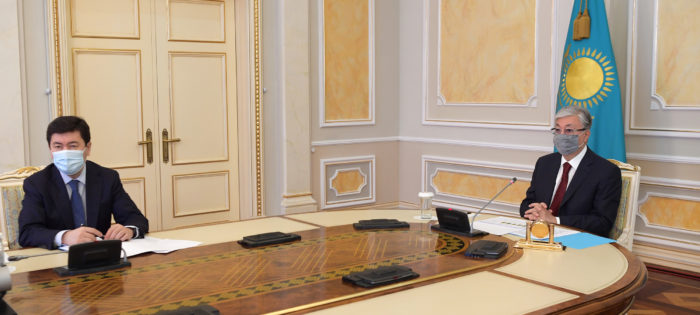NUR-SULTAN – The National Bank can take additional measures to stabilize the exchange rate if it is necessary, said Kazakh President Kassym-Jomart Tokayev during a meeting with Yerbolat Dossayev, chair of the country’s financial regulator, who also briefed the president on the monetary policy results of 2019, the asset quality review of second-tier banks as well as gold and foreign exchange reserves of the National Bank and the assets of the National Fund, according to the Akorda press service.

Photo credit:Akorda press service.
A stable exchange rate remains a top priority for Tokayev.
“I stress the need for coordinated work between the government and the national bank in this issue. The practice of selling surplus currency to the domestic market by quasi state-owned companies should continue. If it should be necessary, the national bank ought to step in and take additional measures to stabilize the exchange rate,” said Tokayev.
In May, according to the National Bank press service, the exchange rate varied between 411.55 to 425.41 tenge to one US dollar. The exchange rate now stands at 405.66 tenge per US dollar.
During the meeting, Tokayev also instructed the National Bank, which recently relocated to the new Kazakh capital of Nur-Sultan from Almaty, and the Agency on the Regulation and Development of the Financial Market to proceed with the implementation of a road map based on the results of the asset quality review launched in Kazakhstan in August of 2019. The review called for a more regular assessment of the country’s banking sector. The two institutions should also start monitoring unsecured consumer lending more closely.
Tokayev noted the importance of efficient monetary policy amid the changing realities and stressed the need to take into account “fundamental trends” on global markets in developing the nation’s own monetary policy strategy going into 2030.
“New strategy should create a stimulus for macroeconomic stability and the sustainable development of the country’s financial system,” the Akorda press service reported.
Tokayev believes that the financial sector will benefit from increased transparency of its activities, which are particularly relevant amid the increasing prevalence of fraudulent activities engaged in by so-called pawnshops and microfinance organizations.
“I instructed (earlier) banks to get to work on conducting an audit of pawnshops and other financial organizations and to report back to me on that issue. It is necessary to speed up this work. Based on the results of this audit, I will instruct the agency with the General Prosecutor’s Office to suggest ways to engage in the systematic improvement of regulation in this area and the protection of consumer rights,” said Tokayev.
Global trends and the country’s performance amid the pandemic revealed the need to incorporate high tech in the financial sector. In doing so, the national bank and the Astana International Financial Centre will strive to implement the development of financial technologies and innovations through 2025.
The national bank should also ensure that the economy and businesses have access to active lending support, said the president.
“Over the past three years, there has been no particular growth in lending to the economy. Banks do not compete actively for each client by offering them the most convenient and favourable conditions for work. At the same time, in today’s realities, businesses need a financial resource that they can get as quickly as possible. Therefore, the agency for the regulation and development of the financial market, together with the national bank, should take measures to increase lending to the economy and small and medium-sized businesses,” said Tokayev.
